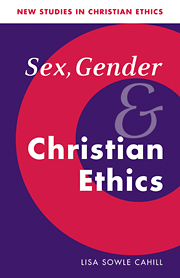Book contents
- Frontmatter
- Contents
- General editor's preface
- Acknowledgments
- 1 Sex, gender, and the problem of moral argument
- 2 Feminism and foundations
- 3 Particular experiences, shared goods
- 4 “The body” – in context
- An interlude and a proposal
- 5 Sex, gender, and early Christianity
- 6 Sex, marriage, and family in Christian tradition
- 7 The new birth technologies and public moral argument
- Concluding reflections
- Notes
- Index
- New Studies in Christian Ethics
An interlude and a proposal
Published online by Cambridge University Press: 05 June 2012
- Frontmatter
- Contents
- General editor's preface
- Acknowledgments
- 1 Sex, gender, and the problem of moral argument
- 2 Feminism and foundations
- 3 Particular experiences, shared goods
- 4 “The body” – in context
- An interlude and a proposal
- 5 Sex, gender, and early Christianity
- 6 Sex, marriage, and family in Christian tradition
- 7 The new birth technologies and public moral argument
- Concluding reflections
- Notes
- Index
- New Studies in Christian Ethics
Summary
The first four chapters have undertaken to show that moral reflection on sex and gender need not become so befuddled at diversity that normative inquiry is a lost cause. With appropriate caveats and epistemological caution, we may consider sex and gender as representing human realities which are both bodily and social. If socialization is always culturally various, human existence in the body provides at least a base point for communication, empathy, and critical assessment of the relationships and institutions which mediate experiences of maleness, femaleness, and sexuality.
In the next several chapters, Christian socializations of sex and gender will be addressed. Primitive Christian practice exalted virginity and sacramentalized marriage to transform dehumanizing socializations of the sexual, reproductive body. Yet Christian tradition has been ambiguous. It has defended marriage as good, and in many ways protected the freedom of spouses and the dignity of women against familial control. On the other hand, it has also produced oppressive socializations of the body, some of which have denigrated the reality of sexual experience, especially sexual pleasure, and divided women's virtue between asexual and reproductive roles.
Even to offer this critical statement about Christianity as more than an expression of opinion or bias requires that one draw on some broad, inductive consensus about which expressions of maleness, femaleness, or sex are humanly fulfilling or vicious.
- Type
- Chapter
- Information
- Sex, Gender, and Christian Ethics , pp. 108 - 120Publisher: Cambridge University PressPrint publication year: 1996



